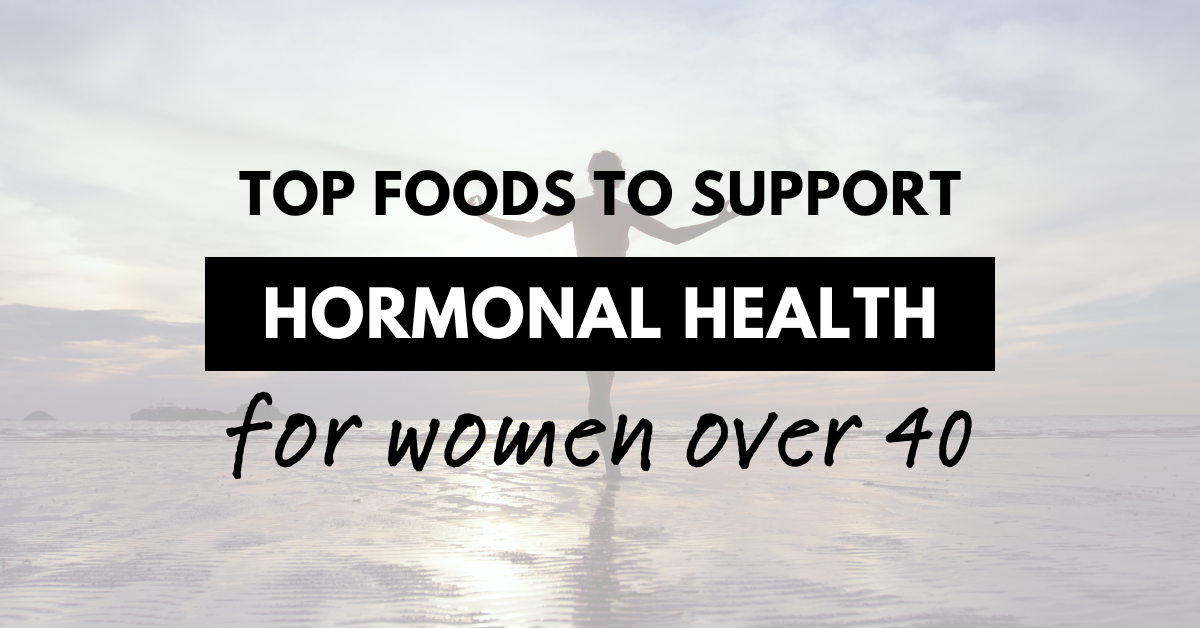Your gut is home to trillions of microorganisms, collectively known as the gut microbiome. These bacteria, fungi, and viruses play a crucial role in digestion, immune function, and even mood regulation. But their influence doesn’t stop there; they also impact hormonal health in several ways:
1. Estrogen metabolism
The gut plays a crucial role in estrogen metabolism through a specialized group of bacteria known as the estrobolome. These bacteria produce enzymes, particularly *beta-glucuronidase*, that help regulate estrogen levels by breaking down and recycling estrogen in the intestines. When the gut microbiome is balanced, this process ensures that excess estrogen is properly metabolized and eliminated through the stool. Gut dysbiosis, which is an imbalance of gut bacteria, can lead to the overproduction or underproduction of these enzymes This causes estrogen to recirculate in the body and can result in estrogen dominance.
Estrogen dominance is a hormonal imbalance that occurs when there is too much estrogen in the body relative to progesterone. This imbalance can happen due to excessive estrogen production, impaired detoxification and elimination of estrogen, or low levels of progesterone, which normally counterbalance estrogen’s effects. Estrogen dominance can arise from various factors, including poor gut health, exposure to endocrine disruptors (like BPA and phthalates), chronic stress, obesity, and hormonal medications. It’s typically associated with symptoms such as PMS, bloating, breast tenderness, and conditions like endometriosis or fibroids.
Supporting gut health through probiotics, fiber, and a nutrient-dense diet helps maintain a healthy estrobolome, ensuring proper estrogen metabolism and hormonal balance.
2. Stress and cortisol
The connection between the gut, stress, and cortisol lies in the gut-brain axis, a bi-directional communication system linking the gut and the brain. Stress triggers the release of cortisol, the body’s primary stress hormone, through the hypothalamic-pituitary-adrenal (HPA) axis. Elevated cortisol levels can negatively impact gut health by reducing blood flow to the digestive system, altering the gut microbiome, and increasing intestinal permeability (leaky gut). This disruption can lead to digestive issues like bloating, inflammation, and nutrient malabsorption, further exacerbating stress and creating a vicious cycle.
At the same time, an imbalanced gut microbiome can impair the body’s ability to regulate cortisol, contributing to prolonged stress responses. Supporting gut health through probiotics, a nutrient-dense diet, and stress management techniques like meditation or deep breathing can help regulate cortisol levels and break the cycle, leading to improved gut function and reduced stress.
3. Thyroid function
The connection between gut health and thyroid function is deeply intertwined, as the gut plays a critical role in the absorption of nutrients and the regulation of thyroid hormones. The thyroid produces thyroxine (T4), which must be converted into its active form, triiodothyronine (T3), for the body to use effectively. This conversion happens primarily in the liver and gut, where beneficial gut bacteria aid in the process. When gut health is compromised—due to dysbiosis, inflammation, or leaky gut—the body’s ability to convert T4 to T3 becomes impaired, leading to low levels of active thyroid hormone. This can result in symptoms of hypothyroidism, such as fatigue, brain fog, weight gain, and hair loss, even when thyroid hormone production itself appears normal.
Moreover, poor gut health can increase inflammation and trigger autoimmune responses, which are directly linked to thyroid disorders like Hashimoto’s thyroiditis. A leaky gut, where the intestinal lining becomes damaged and permeable, allows undigested food particles and toxins to enter the bloodstream, triggering immune responses that may attack the thyroid gland. Additionally, nutrient deficiencies—such as selenium, zinc, and iodine—caused by poor gut absorption further impair thyroid function. Supporting gut health through a balanced diet rich in fiber, probiotics, and anti-inflammatory foods, as well as addressing leaky gut with supplements like L-glutamine and omega-3s, can help restore thyroid balance and improve overall hormone health.
4. Insulin sensitivity
The connection between gut health and insulin sensitivity lies in the gut microbiome’s influence on blood sugar regulation and metabolic health. A healthy gut microbiome, rich in diverse beneficial bacteria, plays a key role in breaking down dietary fibers into short-chain fatty acids (SCFAs) like butyrate. These SCFAs help improve insulin sensitivity by reducing inflammation, enhancing glucose uptake in muscles, and regulating the release of insulin from the pancreas. On the other hand, an imbalanced gut microbiome, known as dysbiosis, can trigger inflammation, impair insulin signaling, and disrupt blood sugar regulation. Dysbiosis has been linked to insulin resistance, a condition where the body’s cells become less responsive to insulin, leading to elevated blood sugar levels and, over time, increasing the risk of type 2 diabetes and polycystic ovary syndrome (PCOS).
Additionally, poor gut health can affect the gut lining, leading to leaky gut syndrome, where the intestinal barrier becomes permeable and allows harmful endotoxins (like lipopolysaccharides) into the bloodstream. These endotoxins trigger systemic inflammation, which interferes with insulin signaling and contributes to insulin resistance. Diets high in processed foods, refined sugar, and artificial additives can worsen this process by feeding harmful bacteria and reducing microbial diversity. To support insulin sensitivity and gut health, focus on consuming a fiber-rich diet with plenty of vegetables, legumes, and whole grains, along with fermented foods like yogurt and kimchi that provide probiotics. Supplements like inulin, berberine, and high-quality prebiotics can also promote a healthier gut environment and improve insulin response, reducing the risk of metabolic disorders.
How to Support Gut and Hormonal Health
Thankfully, there are actionable steps you can take to support your gut and, in turn, your hormones. Here’s what you need to know:
1. Eat a fiber-rich diet
Eating a fiber-rich diet is essential for supporting both gut and hormonal health because fiber acts as fuel for beneficial gut bacteria, promoting a balanced and diverse microbiome. In the gut, fiber is fermented into short-chain fatty acids (SCFAs) like butyrate, which reduce inflammation, strengthen the gut lining, and improve digestion. Fiber also aids in the elimination of excess hormones, particularly estrogen, by binding to them in the digestive tract and ensuring they are excreted rather than recirculated in the body. This process helps prevent estrogen dominance, a common hormonal imbalance linked to PMS, endometriosis, and other conditions. Additionally, a high-fiber diet stabilizes blood sugar levels, improving insulin sensitivity and reducing cortisol spikes, which are crucial for hormonal balance.
Incorporating foods like leafy greens, flaxseeds, chia seeds, legumes, and whole grains into your meals is a simple and effective way to support both gut health and hormone regulation.
Amazon Picks:
2. Incorporate probiotics and fermented foods
Incorporating probiotics and fermented foods into your diet can significantly support gut and hormonal health by promoting a balanced and diverse gut microbiome. Probiotics, which are beneficial bacteria found in foods like yogurt, kefir, sauerkraut, kimchi, and kombucha, help restore and maintain a healthy microbial environment in the gut. This balance is essential for proper digestion, nutrient absorption, and reducing inflammation—all of which impact hormone regulation.
A healthy gut microbiome also aids in estrogen metabolism through the estrobolome, ensuring excess estrogen is properly broken down and eliminated to prevent hormonal imbalances like estrogen dominance. Probiotics improve insulin sensitivity and regulate stress hormones like cortisol by supporting the gut-brain axis. Including fermented foods in your daily diet or taking a high-quality probiotic supplement can be a simple yet powerful step toward optimizing both gut and hormonal health.
Amazon Picks:
3. Support detoxification
Supporting detoxification is essential for maintaining gut and hormonal health because the body relies on efficient pathways—primarily the liver, gut, and kidneys—to eliminate toxins and excess hormones. The liver processes hormones like estrogen and prepares them for excretion, while the gut ensures these byproducts are eliminated through the stool. If detoxification is impaired, toxins and hormones like estrogen can recirculate in the body, leading to imbalances such as estrogen dominance, inflammation, and digestive issues.
Supporting detoxification through a fiber-rich diet, adequate hydration, and foods like cruciferous vegetables, lemons, and leafy greens can help the liver and gut function optimally. Supplements like milk thistle, dandelion root, and activated charcoal can support liver detoxification, while probiotics and prebiotics enhance gut health for efficient elimination. By prioritizing detoxification, you help your body maintain hormonal balance and reduce the toxic load that can disrupt overall well-being.
Amazon Picks:
4. Balance blood sugar levels
Balancing blood sugar levels is crucial for supporting both gut and hormonal health because blood sugar spikes and crashes can disrupt key hormonal systems, including insulin, cortisol, and sex hormones. When blood sugar is consistently elevated due to a diet high in refined carbs and sugar, it can lead to insulin resistance, which negatively impacts hormonal balance and contributes to conditions like PCOS and estrogen dominance.
Unstable blood sugar also triggers stress hormone production, particularly cortisol, which can disrupt the gut lining and alter the composition of the gut microbiome. Over time, this imbalance can lead to inflammation, poor digestion, and nutrient malabsorption, further impacting hormonal regulation. By prioritizing balanced meals with protein, healthy fats, fiber, and complex carbohydrates, you can stabilize blood sugar, support insulin sensitivity, and create a healthier environment for your gut and hormones to thrive.
Amazon Picks:
- Organic Ceylon Cinnamon Powder (for blood sugar support)
- Collagen Protein Powder
5. Get enough sleep
Getting enough sleep is essential for supporting both gut and hormonal health, as sleep plays a vital role in regulating the body’s restorative processes. During deep sleep, the body repairs tissues, strengthens the immune system, and balances hormone production, including cortisol, insulin, and growth hormone. Poor or insufficient sleep disrupts the gut microbiome by increasing stress hormones like cortisol, which can lead to inflammation, impaired digestion, and changes in gut bacterial diversity. This disruption can also impact hormonal balance, leading to issues like insulin resistance, estrogen dominance, and thyroid dysfunction.
Furthermore, quality sleep supports the gut-brain axis, helping to regulate mood, stress, and appetite hormones such as leptin and ghrelin, which control hunger and satiety. Prioritizing 7–9 hours of restful sleep each night is a simple yet powerful way to optimize gut health, restore hormonal balance, and enhance overall well-being.
Amazon Picks:
6. Exercise regularly
Exercising regularly is a powerful way to support both gut and hormonal health by promoting better digestion, reducing inflammation, and enhancing hormone regulation. Physical activity increases blood flow to the digestive system, improving gut motility and reducing the risk of constipation. It also encourages a healthier gut microbiome by boosting the diversity of beneficial bacteria, which play a key role in digestion, nutrient absorption, and hormone metabolism.
Regular exercise helps regulate stress hormones like cortisol, preventing chronic elevation that can harm the gut lining and disrupt hormonal balance. Additionally, exercise improves insulin sensitivity, which stabilizes blood sugar levels and supports hormones like estrogen, progesterone, and thyroid function. Incorporating activities such as strength training, walking, and yoga into your routine can help maintain a balanced gut and hormonal system, leading to better energy, mood, and overall health.
Amazon Picks:
7. Manage stress
Managing stress is crucial for supporting both gut and hormonal health because chronic stress disrupts the delicate balance of these systems. Elevated stress levels lead to the overproduction of cortisol, the body’s primary stress hormone, which can weaken the gut lining, alter the composition of the gut microbiome, and slow digestion. This creates a cycle of inflammation and gut dysfunction that negatively impacts hormone regulation, including insulin, thyroid hormones, and estrogen.
Stress also disrupts the gut-brain axis, a communication network that regulates mood, appetite, and hormonal responses. By incorporating stress management techniques such as mindfulness, meditation, deep breathing, or regular physical activity, you can reduce cortisol levels, improve gut health, and support a more balanced hormonal environment. Taking time to prioritize relaxation and self-care can have profound effects on your overall health and resilience.
Amazon Picks:
Supplements for Gut and Hormonal Health
Supplements can provide valuable additional support for gut and hormonal health, but they are most effective when used alongside foundational lifestyle changes such as a balanced diet, stress management, quality sleep, and regular exercise. For gut health, supplements like probiotics, digestive enzymes, and L-glutamine can help restore the gut lining, improve digestion, and balance the microbiome. Hormonal health can benefit from key nutrients such as magnesium for stress and sleep, omega-3 fatty acids for reducing inflammation, and vitamin D for hormone production and immune support.
Herbs like milk thistle aid liver detoxification, while adaptogens like ashwagandha help regulate cortisol levels. However, supplements should complement—not replace—healthy habits, as real, long-term results come from sustainable lifestyle practices. It’s important to consult with a healthcare professional to identify which supplements are right for your unique needs and to ensure they align with your overall wellness plan.
Here are my favorite supplements for supporting gut and hormonal health:
- Probiotics: Support a healthy microbiome and estrogen metabolism.
Amazon Pick: Probiotic for Women - Digestive Enzymes: Help with proper food digestion and reduce gut inflammation.
Amazon Pick: Plant Based Digestive Enzymes - Magnesium: Reduces cortisol levels and supports sleep.
Amazon Pick: Sucrosomial Magnesium Capsules - Vitamin D: Essential for hormone production and gut lining health.
Amazon Pick: Vitamin D3 + K1 and K2 - Omega-3 Fatty Acids: Reduce inflammation in the gut and improve hormone signaling.
Amazon Pick: Fish Oil with Vitamin E and Lemon Oil
Lifestyle Tips for Long-Term Gut and Hormone Health
In addition to diet and supplements, these habits can make a big difference:
1. Limit antibiotic use
Limiting antibiotic use is essential for maintaining long-term gut and hormonal health because antibiotics disrupt the delicate balance of the gut microbiome by wiping out both harmful and beneficial bacteria. This disruption, known as dysbiosis, can lead to digestive issues, weakened immunity, and impaired estrogen metabolism, which may contribute to hormonal imbalances like estrogen dominance. Additionally, antibiotics can hinder the gut’s ability to support stress hormone regulation and thyroid function, compounding their impact on hormonal health.
If antibiotics are necessary, take steps to restore your microbiome afterward. Incorporate a high-quality probiotic supplement, eat fermented foods, and focus on a fiber-rich diet to help beneficial bacteria flourish. Pairing these strategies with gut-healing foods like bone broth and omega-3 fatty acids can further support recovery and minimize long-term disruptions.
2. Stay hydrated
Staying hydrated is crucial for long-term gut and hormonal health because water plays a foundational role in nearly every bodily function. In the gut, proper hydration supports digestion by facilitating the breakdown of food, aiding in the production of digestive enzymes, and ensuring smooth movement of waste through the intestines. Dehydration can slow gut motility, leading to constipation and a buildup of toxins that the body struggles to eliminate. This toxin buildup can interfere with hormone balance, particularly by affecting estrogen metabolism and increasing systemic inflammation. Hydration also helps maintain the integrity of the gut lining, which is essential for preventing leaky gut—a condition that can disrupt hormonal signaling and trigger immune responses.
Mild dehydration can manifest through a range of symptoms that often go unnoticed but significantly impact your health. Common signs include fatigue, brain fog, headaches, dry skin, and decreased urine output. You may also experience irritability, lightheadedness, and constipation, which further underscores the gut-hormone connection. Hormonal systems like the thyroid and adrenal glands are particularly sensitive to dehydration; when water intake is insufficient, stress hormone levels like cortisol may increase, while metabolism may slow down. To maintain optimal hydration, aim to drink water consistently throughout the day, and consider adding electrolytes if you’re active or live in a hot climate. Simple habits like starting your morning with a glass of water or flavoring it with lemon or cucumber can make staying hydrated more enjoyable and sustainable.
3. Reduce toxin exposure
Reducing toxin exposure is vital for long-term gut and hormonal health because many common chemicals, such as BPA, phthalates, and pesticides, act as endocrine disruptors. These substances interfere with the body’s natural hormonal signaling, potentially leading to imbalances in estrogen, cortisol, and thyroid hormones. In the gut, toxins can damage the intestinal lining, contributing to leaky gut syndrome, which allows harmful particles to enter the bloodstream and trigger inflammation. This inflammation not only impacts digestion but can also disrupt hormone regulation and increase the risk of chronic conditions like PCOS, endometriosis, and metabolic disorders. By limiting your exposure to these toxins, you support your gut’s ability to maintain a healthy microbiome and allow your hormonal systems to function optimally.
Switching to non-toxic alternatives for everyday items is a practical way to reduce your exposure to these harmful substances. For example, replace plastic food containers with Glass Meal Prep Containers that are free from BPA and won’t leach chemicals into your food. Opt for a Non-Toxic All-Purpose Cleaner made with plant-based ingredients in a glass bottle to reduce exposure to harsh cleaning chemicals that can disrupt your hormones.
For personal care, consider swapping conventional beauty products for Organic Natural Deodorant and Sulfate-Free Shampoo Bar, which are free from parabens and phthalates. Look for zero waste products that use recyclable cardboard, glass or aluminum instead of plastic. Small changes like these can significantly decrease your toxic load over time, benefiting both your gut and hormonal health.
4. Track your symptoms
Tracking symptoms is incredibly beneficial for long-term gut and hormonal health because it allows you to identify patterns and potential triggers that might be impacting your well-being. By consistently documenting how you feel—such as changes in digestion, energy levels, mood, or menstrual cycles—you can uncover correlations between lifestyle factors (like diet, sleep, and stress) and your symptoms. For example, you might notice that certain foods exacerbate bloating or that stress intensifies hormonal imbalances like PMS. This self-awareness empowers you to make informed choices, pinpoint potential root causes of issues, and communicate more effectively with healthcare providers, enabling more personalized and effective interventions.
To get started, use a dedicated symptom-tracking tool or journal, such as the Wellness Tracker Journal, which is specifically designed for logging health patterns. Be consistent and detailed—note the date, time, symptoms, and any relevant lifestyle factors such as meals, hydration, or exercise. Digital options like symptom-tracking apps can also be handy for setting reminders and organizing your data. For menstrual and hormonal health, consider a cycle-tracking tool like the Tempdrop Wearable Thermometer, which tracks basal body temperature and offers insights into hormonal fluctuations. Over time, your records can reveal trends that help you fine-tune your approach to gut and hormonal health, ensuring that you’re addressing issues proactively and holistically.
Closing thoughts
Understanding the connection between gut health and hormonal health reveals how deeply these systems impact your overall well-being. By focusing on key lifestyle changes—such as nourishing your gut with fiber and probiotics, managing stress, balancing blood sugar, and prioritizing quality sleep—you can create a strong foundation for hormonal balance and long-term health. Small, consistent steps make a big difference, and I’m here to help you every step of the way.
If you’re ready to dive deeper into restoring balance and feeling your best, I invite you to join my Free Workshop: Hormonal Harmony for Women Over 40. In this workshop, you’ll learn practical strategies to support your gut and hormones, reclaim your energy, and thrive during this transformative stage of life. Don’t miss this opportunity to take charge of your health—register today using the form below and start your journey toward true hormonal harmony!







